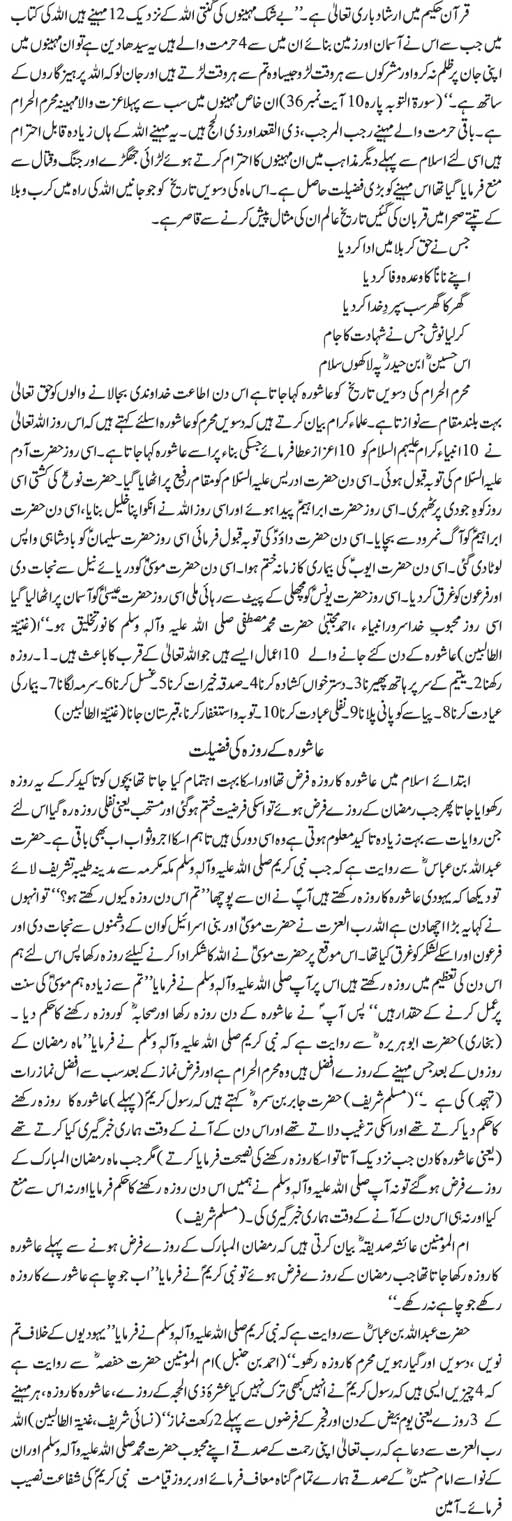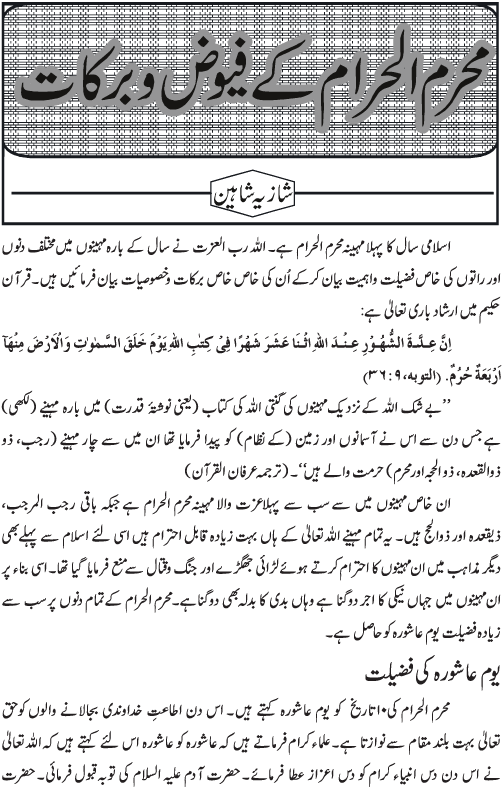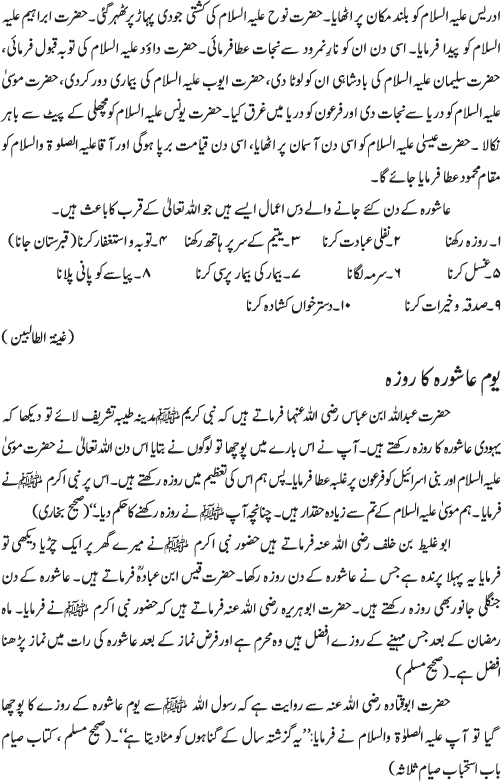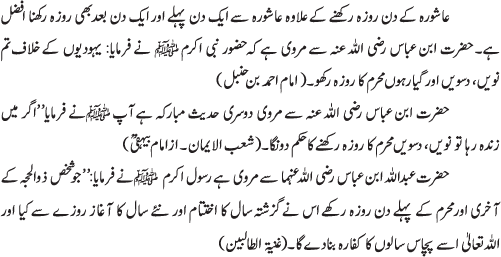
TAG: Aashura
Muharram: Ethics And Significance
THE month of Muharram is one of the sacred months. A Muslim is supposed to gain the advantage of these months so as to draw nearer to Allah by offering voluntary religious deeds such as supererogatory prayers, voluntary fasting, charity, etc.
In the month of Muharram, we should remember the Hijrah of the Prophet (peace be upon him) from Makkah to Madina. There are many lessons in this story and it can help us understand the basic significance of the Hijrah calendar. It is good to remember that Hijrah was a significant move for the growth of Islam and throughout history, Islam has benefited from the Hijrah.
The presence and growth of Islam in America also came from the efforts of those who migrated to this land and worked for the cause of Allah.
It is also the Sunnah of the Prophet (peace be upon him) to fast on the 9th and 10th of Muharram. The Prophet (peace be upon him) used to fast on the 10th day (Ashura). When he came to Madina, he found out that the Jews of Madinah were also fasting on that day remembering Prophet Musa (peace be upon him). The Prophet (peace be upon him) admired this tradition and he said to the Jews, “We are closer to Musa than you are.” He fasted and also told his Companions to fast on this day. Later the Prophet (peace be upon him) told Muslims to add 9th day also. Thus, it is recommended to fast on both the 9th and 10th of Muharram.
It is also good to remember the great sacrifice of Al-Hussain and his family (may Allah be pleased with all of them). Theirs was the true Jihad for the cause of truth and justice. We should learn the lessons of courage, patience and perseverance from the episode of Karbala.
Maah-e-Muharram Kay Fayuz-o-Barakat



Maah-e-Muharram Kay Fayuz-o-Barakat
Hurmat And Tazeem Muharram

Hurmat And Tazeem Muharram
Muharram And Aashura
Every year, when the blessed month of Muharram enters, we are reminded of certain incidents: The Hijrah, The Day of Aashura, and The Martyrdom of Sayyidina Husain (R.A). These are generally the topics of discussion in the month of Muharram and Insha-Allah, something will be said with respect to each one.
The Hijrah
During the Khilafat of Hazrat Umar (R.A), Islam had spread far and wide and there was a need to have some kind of date for the correspondence that was being sent out. Hazrat Umar (R.A) thus consulted with the Sahaaba-e-Kiraam (R.A) as to when the calendar should begin. Different views were presented before Hazrat Umar (R.A) wisely declared that the calendar begin with the Hijrah.
Many lessons are taken from this decision :
In this month of Muharram, we are reminded of the great sacrifices made for the Deen of Islam. Rasulullah and his companions had to leave their beloved Makkah Mukarramah, their homes, and even their families, and that too after a long and trying period of immense persecution, torture, and trials. The month of Muharram delivers us to the days of Rasulullah and we see the many trials and difficulties that the Beloved of Allah Ta’ala underwent. As we turn the pages of history, we see the three solid years of ostracism that were so patiently endured, despite the extreme and severe conditions, where food and drink and other necessities of life were cut off from the Muslims.
We take a glimpse at the grief and sorrow that burdened the heart of Rasulullah when his beloved wife, Hazrat Khadija (R.A) passed away; his support and his companion through those trying times. Then followed the loss of his uncle, Abu Talib, who had also been a means of support and protection. The year was thus called ‘The year of grief.
We turn another page and we behold the cruel experiences that Nabi endured in Taif: The rejection, the scorn, the mockery, and the stoning. …Of whom? The greatest after Allah Ta’ala. And as we turn more pages of history, we read of the culmination of all the evil plans and plots, with the decision to assassinate Rasulullah. This was the setting that opened the door to the Hijrah. Family, property, land …everything was sacrificed on the instruction of Allah Ta’ala to migrate from Makkah Mukarramah to Madina Munawwarah.
Life was a constant struggle: Overcoming one obstacle meant being confronted by another and yet another – but there was no losing hope, no despondency. Just absolute trust and unwavering faith in Allah Ta’ala. On every occasion, there was the assurance that Allah Ta’ala was with us. …How beautiful and comforting the words of Rasulullah to Hazrat Abu Bakr (R.A) during their perilous stay in the cave of Thaur… “Don’t be sad. Verily Allah is with us.”
So these incidents – which run into thousands – are lessons for mankind till the Day of Qiyaamah, more especially, we who are Muslims.
Reflecting over that period of struggle and we learn that if we say that we believe and that we have submitted, then we too will face different challenges, tests and trials, toil and struggle, and sacrifices will have to be rendered for this Imaan and for this beautiful Deen of Islam.
At the same time, each incident offers consolation to us all: If Rasulullah and his faithful companions could have undergone such severe trials, then what are our trials in comparison?
Life in this world will never be smooth sailing. There will always be some tests and some kind of sacrifices. For many of us, it is the small test of getting up for Fajr or giving up sins. What great sacrifice is there in this? Compare it to the sacrifices of the Sahaaba-e-Kiraam.
In today’s time, a little difficulty comes the person’s way and the person gives up his Deen; a little test and the person accepts another religion.
Our lives will offer us a share of struggle: The tests we face are sometimes in our home life, sometimes with family or neighbors, sometimes in business, and sometimes at the schools, colleges, and universities … but we should keep before us these exceptional incidents from the life of Rasulullah and the lives of his noble companions, of sacrifice and endurance against all odds.

